Words of Wisdom - Shastra
& Shastrakaras speak
For Books and shastra downloads see Main Index, under
Books:
Om Namo Bhagavate Vasudevaya
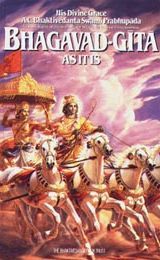

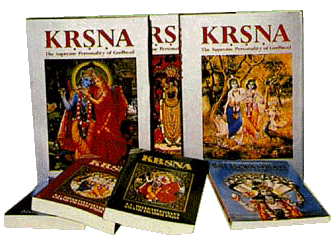
The Complete Works of Srila Prabhupada
All the books, the letters and conversations at your
fingertips
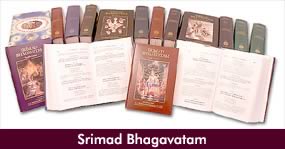
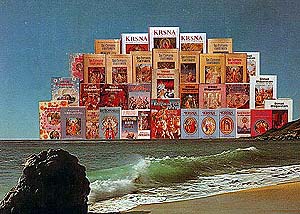
All Srila Prabhupada's books and more on one disk
http://www.vedabase.com




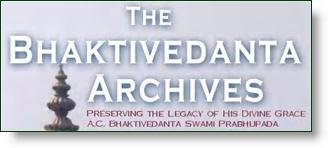
Srila Prabhupada's Audio lectures to listen to on-line:
http://www.hare-krishna.org/srila-prabhupada-lectures.htm
Listen to Srila A.C. Bhaktivedanta Swami Prabhupada on-line
- all 900 of his lectures are available HERE:
http://www.prabhupadavani.org/
Srimad Bhagavatam - the entire lecture series listen and
read along on-line - Narrated by Amala Bhakta dasa:
http://www.prabhupadavani.org/SB_index.html

The new enhanced Prabhupada MP3 series
http://www.prabhupada.com/store/store.php?page=product.php&id=MP3AUDIOLIB








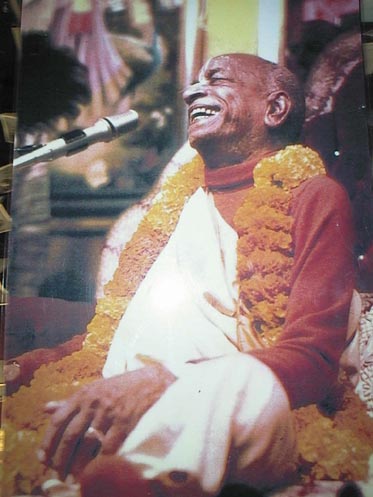
Visit "Prabhupada Connect" for all manner of Prabhupad
Nectar:
http://www.prabhupadaconnect.com/Index.html
Srila Prabhupada's Final Lesson Video - Downloadable and
viewing on-line
http://users.iskconludhiana.com/images/thumbnails.php?album=21


All Srila Prabhupada's original books
available for sale here.

Download all the Hare Krsna teachings which includes
all Vaisnava and
Vedic concepts by visiting one of the sites listed at
the following address.
http://www.geocities.com/suci123/bookdownloadsites1.html
The Bhaktivedanta Book Trust
Srila Prabhupad Memorial Library
http://www.krishna.com/main.php?id=33


33 Books Online Including Srimad Bhagavatam!
http://www.geocities.com/freeprabhupadabooks
The compressed "self extracting" file mentioned is now currently
available for download
http://www.krsnaconsciousness.org/Gauranga/Folio/BhaktivedantaVedabase_DOS.exe

Download or Listen to Prabhupad Bhajans HERE:
http://www.prabhupadavani.org/web/text/Bhajans.html


On-line 1972 McMillan edition - Bhagavad Gita As It Is:
http://www.asitis.com/

Bhagavad Gita AS IT IS on-line through the Tirupathi
Balaji site:
http://www.bhagavad-gita.us/

Bhagavad Gita Study guide on-line book:
http://chantandbehappy.com/gita/studyguide/StudyGuide-main.htm
Bhagavad Gita Study guides by numerous Iskcon devotees
- FREE downloads:
http://www.veda.harekrsna.cz/library/#3

All the Scriptures you'd ever need 4 FREE
http://www.hknet.org.nz/index-books.htm
http://www.hknet.org.nz/DDB.htm
http://www.hknet.org.nz/DDB2.html
last updated 4th August 2003


Srimad Bhagavad Gita AS
IT IS
Bhagavad Gita: Chapter
6 - Dhyana-yoga
TEXT 25
sanaih sanair uparamed
buddhya dhrti-grhita ya
atma-samstham manah krtva
na kincid api cintayet
WORD FOR WORD
sanaih--gradually; sanaih--step by step; uparamet--one
should hold back; buddhya--by intelligence; dhrti-grhitaya--carried by
conviction; atma-samstham--placed in transcendence; manah--mind; krtva--making;
na--not; kincit--anything else; api--even; cintayet--should think of.
TRANSLATION
Gradually, step by step, one should become situated in
trance by means of intelligence sustained by full conviction, and thus
the mind should be fixed on the self alone and should think of nothing
else.
PURPORT by HDG Srila A.C. Bhaktivedanta Swami Prabhupad:
By proper conviction and intelligence one should gradually
cease sense activities. This is called pratyahara. The mind, being controlled
by conviction, meditation, and cessation from the senses, should be situated
in trance, or samadhi. At that time there is no longer any danger of becoming
engaged in the material conception of life. In other words, although one
is involved with matter as long as the material body exists, one should
not think about sense gratification. One should think of no pleasure aside
from the pleasure of the Supreme Self. This state is easily attained by
directly practicing Krsna consciousness.
His Divine Grace A.C. Bhaktivedanta Swami Prabhupada
Copyright 1983 The Bhaktivedanta Book Trust International. Used with
permission.

Bhagavad Gita As It Is - http://www.asitis.com/
Bhaktivedanta Vedabase - Bhagavad Gita on-line http://bhagavadgitaasitis.com/
Bhaktivedanta VedaBase: Bhagavad-gita As It Is http://vedabase.net/bg/en
Bhagavad Gita Multi Media Web-version http://chantandbehappy.com/gita/
Listen to Bhagavad Gita on line - http://www.Gitamrta.org
View our Bhagavad Gita Overview:
http://www.hknet.org.nz/BG.html
Archive: http://www.cs.rice.edu/~vivek/btg/archive/
Home Page: http://www.cs.rice.edu/~vivek/btg/
Join Bhagavad Gita eGroups HERE
mailto:bhagavad_gita-owner@egroups.com


Prabhupada Uvacha:
(here's some nectar, sometimes it comes in the form of Srutakirti prabhu's
diary, other times from Govinda dasi's diary, Hari Sauri prabhu's Transcendental
Diary, Bhurijan prabhu's book, or sometimes from a letter, or other related
source, but still nectar...)
June 20th, 1976
For his Srimad-Bhagavatam discourse, Prabhupada
spoke on 7.6.4. Pradyumna led the devotees in chanting the verse and then
loudly read out the translation. "Endeavors merely for sense gratification
or material happiness through economic development are not to be performed,
for they result only in a loss of time and energy, with no actual profit.
If one's endeavors are directed toward Krsna consciousness, one can surely
attain the spiritual platform of self-realization. There is no such benefit
from engaging oneself in economic development."
Prabhupada said this is "the essence of instruction
of all Vedic instructions." Roundly condemning entire civilizations, such
as the British Empire, Prabhupada declared all their efforts were useless
endeavors because they only aimed at temporary economic improvements. He
told us that without knowledge of self-realization, there is only animal
civilization. "Therefore Prahlada Maharaja says don't waste your time.
It is very important verse. Everyone is trying to improve the condition
of animal life, that's all. What is animal life? Eating, sleeping, sex
and defense. Our big, big states, big, big countries, especially nowadays,
USA and Russia or China, manufacturing atom bomb. So what is this atom
bomb? Defense. How to get out of fear. That you may try, but it will never
be successful. You may waste your time, but bhaya will always be there;
either you have got atom bomb or any big type of defense, when death will
come, it will not defend you. By force, that is God. You may try to make
very good arrangement for defending, but your life will never be saved.
Mrtyuh sarva-haras caham. The atheistic class of men, they are trying to
make arrangement for defending his life, but Krsna says that 'I'll come
to you as death. I'll take out all your possessions. Whatever defensive
measure you have made, I'll take everything. You'll be alone.' 'No, my
nation, my country, my society, my wife, my children, my bank balance,
they'll save me.' No, that will not save you. Then what is that verse?
Dehapatya-kalatradisv atma-sainyesv asatsv api/ tesam pramatto nidhanam
pasyann api na pasyati. Everything is discussed. Everyone is thinking that
'I have got a very strong body. I run five miles a day. So I have made
a so strong body, I'll never die.' 'That is not possible sir. You have
to die.' So dehapatya. 'My sons are very well educated. They are holding
big, big post, minister. They will.' 'No, sir. They'll not be able to.'
Kalatra. 'My wife is so sincere, so faithful. She will give me protection.'
'No, sir.'
"We are thinking atma-sainya. 'They are my soldiers.
I am struggling for existence and these soldiers will give me protection.'
So pramattah. The Bhagavata says, he's so mad that he knows that 'These
things will be finished. Nobody will be able to give me protection,' still
he... And as soon as this body's finished, another body's waiting. That
you do not know what kind of body you are going to get. That you have to
know by your work. Now if this life I may become a prime minister and big,
big man. But when I come in politics I have to deal with so many people
in so many nefarious ways and lives that out of my karma, I'll get the
next body according to my karma. Now if I've acted just like menial animal,
then next life animal. This life I am prime minister, and next life if
I become a dog, then what is my profit?"
He appealed to his followers to remain faithful
to his goal of establishing a society of first-class men who are fixed
in the real goal of life. "Truthful, very peaceful, full of knowledge,
very simple, tolerant and believer in the sastra, these are the symptoms
of first-class men. So where is that first-class man throughout the whole
world? So this Krsna consciousness movement is trying to create at least
one section first-class men so that people may see, 'Oh, here are ideal
men.' Therefore my request to persons who have joined this Krsna consciousness
movement, they should very carefully keep themselves as first-class men.
People will appreciate and they will try to follow. Yad yad acarati sresthas
tat tad evetaro janah. If there is a class of men first class, then people
will appreciate. At least, even though they are unable to become first
class, they will try to follow.
"If a teacher does not smoke, the students also
will stop smoking naturally. But if the teacher is smoking, how the students...?
They are also smoking in the class. I have seen in New York. At least in
India this is not yet begun. It will begin, because they are also making
progress. These rascals are making progress, going to hell. So, Prahlada
Maharaja advises, don't waste your valuable time in so-called economic
development and nonsense activities. Try to become a devotee of Mukunda.
Then your life will be successful. Thank you very much."
- From the "A Transcendental Diary Vol 2" by HG
Hari Sauri dasa
To receive little snippets of nectar like this on a daily basis subscribe
HERE: or If you want to introduce anyone else in reading Srila Prabhupada
Nectars, please send their eMail addresses to mailto:krpamaya_gauranga@hotmail.com
Please Chant:
 Hare
Krishna Hare Krishna Krishna Krishna Hare Hare
Hare
Krishna Hare Krishna Krishna Krishna Hare Hare
 Hare
Rama Hare Rama Rama Rama Hare Hare
Hare
Rama Hare Rama Rama Rama Hare Hare
...................and be Happy

Listen to Srila Prabhupad on-line
....a different lecture, morning walk, conversation or
class daily.
"Cornerstone For Godly Civilization"
75/01/23 Bombay, Bhagavad-gita 16.7-9
>>> Ref. VedaBase => Cornerstone
Laying -- Bombay, January 23, 1975
Listen to the entire lecture on-line:
http://prabhupadaradio.com/M3U/Gita/m3u/GT330.m3u
Prabhupada: (chants mangalacarana prayers) Hm? You bring.
You can bring one chair here. (pause)
pravrttim ca nivrttim ca
jana na vidur asurah
na saucam napi cacaro
na satyam tesu vidyate
asatyam apratistham te
jagad ahur anisvaram
aparaspara-sambhutam
kim anyat kama-haitukam
etam drstim avastabhya
nastatmanah alpa-buddhayah
prabhavanty ugra-karmanah
ksayaya jagatah ahitah
Just like we were talking of industries. The industries,
they are mentioned in the Bhagavad-gita as ugra-karma. Ugra-karma means
ferocious activities. For livelihood, we require our maintenance. Ahara-nidra-bhaya-mai...
These are the primary necessities of this body, material body. For that,
Krsna has said, annad bhavanti bhutani. Anna -- means food grains -- we
require. Annad bhavanti bhutani. That food grains we can produce very easily
by agriculture. In another place, Krsna says, krsi-go-raksya-vanijyam vaisya-karma
svabhava-jam [Bg. 18.44]. We can produce sufficient food grains for our
maintenance, and the whole world has got sufficient land. I have traveled
over the world at least fourteen times. During the last eight years, I
have traveled all over the world, even interior. I have seen there is enough
land, especially in Africa, in Australia, in America, and we can produce
so much food grains that ten times of this present population can be easily
maintained. Ten times. There is no scarcity of food. But the difficulty
is that we have demarcated, "This is my land." Somebody says, "This is
America, my land," "Australia, my land," "The Africa, my land," "India,
my land." This "my" and "I." Janasya moho 'yam aham mameti [SB 5.5.8].
This is called illusion, that "I" and "my." "I am this body, and this is
my property." This is called illusion. And this illusion, if we stand on
this platform of illusion, then we are no better than the animals.
yasyatma-buddhih kunape tri-dhatuke
sva-dhih kalatradisu bhauma ijya-dhih
yat-tirtha-buddhih salile na karhicij
janesu abhijnesu sa eva go-kharah
[SB 10.84.13]
Go means cow, and kharah means ass. Those who are in the
bodily concept of life, aham mameti [SB 5.5.8], they are no better than
these asses and the cows, means the animals. This is going on. I'll not
take much of your time, but I shall try to convince you what is the purpose
of this Krsna consciousness movement. The purpose of this Krsna consciousness
movement is to save the human society from becoming animals, cows and asses.
This is the movement. They have established their civilization... As it
is stated in the Bhagavad-gita, animal or asuric civilization, asuric civilization,
beginning is pravrttim ca nivrttim ca jana na vidur asurah. The asuric,
demonic, civilization, they do not know in which way we have to guide ourself
for attaining the perfection of life, pravrtti, and nivrtti, and which
we shall not take -- favorable and unfavorable. Human life... Everyone
knows, "This is favorable for me, and this is unfavorable for me." So asurah
jana, those who are demonic persons, they do not know this, that "What
is favorable for me and what is not favorable for me." Pravrttim nivrttim
ca jana na vidur asurah, na saucam napi cacarah: "There is no cleanliness,
nor good behavior." Na satyam tesu vidya...: "And there is no truth in
their life." This is asuric. We have heard many times, "asuras," "asuric
civilization," "demonic civilization." This is the beginning.
pravrttim ca nivrttim ca
jana na vidur asurah
na saucam napi cacaro
na satyam tesu...
Satyam, there is no truthfulness. And just the first-class
life means the brahmana life. Satyam saucam tapo. The beginning is satyam.
The asuric life is no satya, no truth, and the first-class life in human
society, the brahmanas, is satyam saucam tapo, and titiksa arjavah astikyam
jnanam vijnanam. This is first-class life.
So our Krsna consciousness movement is to create a class
of men ideal, first-class men with satyam saucam tapo samah damah titiksah.
This is godly civilization. And this godly civilization can be given to
the whole world by India. That is India's special privilege. Because in
other countries beyond India they are almost asuri-jana and ugra-karma.
The industries and other ugra-karma has come from the Western countries.
But by this way people will never be happy. That is very elaborately explained
in the Sixteenth Chapter of the Bhagavad-gita. Duspura akanksa. Their desire
will never be satisfied by this material advancement. They do not know.
They are forgetting. So we selected this Bombay. Bombay city is the best
city, most advanced city in India, the best city in India. And people are
also very nice. They are religiously inclined. They are opulent. They can
take up better things very nicely. Therefore I wanted to start this center,
Bombay, for spreading this Krsna consciousness movement. Although there
have been many impediments in my endeavor, still, ultimately it is Krsna's
business. It will come successful. So today... The foundation and cornerstone
establishment was done two years before, but there were many, many impediments
from the asuric jana. Now, some way or other, we have got little relief
from such impediments. So we are putting this cornerstone this auspicious
day, and I am very glad that you have joined us.
So the mission is very, very authorized, and it comprehends
a very large jurisdiction of activities. Therefore my request is that the
inhabitants of Bombay, especially those who are our members, they will
kindly take active part, how to make this institution very successful in
Bombay. So many ladies and gentlemen are present here. We are, whatever
we are doing it is not whimsical or mental concoction. It is authorized
and just to the standard of Bhagavad-gita. Our present movement is based
on Bhagavad-gita -- Bhagavad-gita as it is. We don't interpret. We do not
interpret foolishly because... I say purposefully this word "foolishly,"
that why should we interpret Krsna's words? Am I more than Krsna? Or did
Krsna leave some portion to be explained by me by interpretation? Then
what is the importance of Krsna? If I give my own interpretation, thinking
myself more than Krsna, this is blasphemy. How I can become more than Krsna?
If actually we want to take advantage of this Bhagavad-gita, then we must
take Bhagavad-gita as it is. Just like Arjuna took. Arjuna, after hearing
Bhagavad-gita, he said, sarvam etam rtam manye: "I accept all the words,
my dear Kesava, whatever You have said. I accept them in toto, without
any change." This is understanding of Bhagavad-gita, not that I take advantage
of the Bhagavad-gita and I interpret in my foolish way so that people will
accept my philosophy. This is not Bhagavad-gita. There is no question of
interpretation in the Bhagavad-gita. Interpretation is allowed when you
cannot understand. When the things are clearly understood... If I say,
"This is microphone," everyone understands this is microphone. Where is
the necessity of interpreting it? There is no necessity. This is foolishness,
misleading. There cannot be any interpretation in the Bhagavad-gita. It
is... Everything is clear to the point. Just like Bhagavan Krsna says...
Krsna does not say that "You all become sannyasi and give up your occupational
duty." No. Krsna says, sva-karmana tam abhyarcya samsiddhih labhate narah.
You remain in your business. You remain your occupation. There is no need
of changing. But still, you can become Krsna conscious and make your life
successful. This is the message of Bhagavad-gita. Bhagavad-gita is not
going to make any topsy-turvy of the social order or spiritual order. No.
It should be standardized according to the authority. And the best authority
is Krsna.
So make this center successful, you ladies and gentlemen
of Bombay. We have got very nice place. We are building so that you can
come here, stay, at least in weekend. If you stay, all those who are retired
or elderly gentlemen, ladies, they can come here and stay. We will have
sufficient place. But try to organize these principles of Bhagavad-gita
all over the world. That will be the gift of India. Caitanya Mahaprabhu
desired that anyone who has taken birth in India as human being, not cats
and dogs... Cats and dog cannot take any part for doing good to others.
He said,
bharata-bhumite manusya-janma haila yara
janma sarthaka kari' kara para-upakara
[Cc. Adi 9.41]
"Anyone who has taken his birth as human being in India,
Bharata-bhumi, first of all make your life successful." Because you have
got the standard, how to make life successful. Here is Bhagavad-gita. Try
to understand it, make your life successful, and then broadcast this message
all over the world. That is paropakara. So actually, India and India's
people, they are meant for paropakara. We are not meant for exploiting
others. That is not our mission. Actually that is being done. Everyone
goes out of India. They go there to exploit. But it is for the first time
that India is giving something to the outsiders, this spiritual knowledge.
And the proof you can see. We are giving, we are not taking. We do not
go to beg, "Give me wheat, give me money, give me this, give me that."
No. We are giving something substantial, and they are feeling obliged.
Otherwise, why these young men and girls, they are after this Krsna consciousness
movement? They are feeling something, that they are getting something tangible.
So it has got potency, very good potency. They are not feeling like Americans
or Canadians or Australians. We are also not feeling as Indians. On the
spiritual platform we are one.
vidya-vinaya-sampanne
brahmane gavi hastini
suni caiva sva-pake ca
panditah sama-darsinah
[Bg. 5.18]
This is real learning. Atmavat sarva-bhutesu. Even the
great politician, Canakya Pandita, he says,
matrvat para-daresu
para-dravyesu lostravat
atmavat sarva-bhutesu
yah pasyati sa panditah
So this is a great culture, Bhagavad-gita as it is. So
those responsible ladies and gentlemen are present here, make this center
very successful and come here, study Bhagavad-gita as it is without any
foolish interpretation. I say foolish again and again because interpretation
is not at all required. Everything is clear, from the very beginning.
dharma-ksetre kuru-ksetre
samaveta yuyutsavah
mamakah pandavas caiva
kim akurvata sanjaya
[Bg. 1.1]
So very clear. Kuruksetra is dharma-ksetra still. In the
Vedas it is stated, kuruksetre dharmam acaret: "One should go to Kuruksetra
and perform religious rituals." Therefore it is dharma-ksetra from time
immemorial. And why should we interpret it that "This Kuruksetra means
this body, dharmaksetra, this body"? Why? Why mislead people? Stop this
misleading. And Kuruksetra is still there. Kuruksetra station, railway
station, is there. So try to understand Bhagavad-gita as it is, make your
life successful, and spread this message all over the world. You will be
happy; the world will be happy. Of course, I am now very old man. I am
eighty years old. My life is finished. But I want some responsible Indian
and combined with other countries... Other countries, they are giving good
cooperation. Otherwise, it was not possible for me to spread in so short
time, only seven or eight years, to preach this cult all over the world.
So I require the cooperation of the Indian, especially young men, educated
men. Come forward. Stay with us. Study Bhagavad-gita. We haven't got anything
to manufacture. Nothing to manufacture. And what we can manufacture? We
are all imperfect. Whatever is there, let us study it and practically apply
in life and spread the message all over the world. That is our mission.
continued.......................
Listen to the entire lecture on-line:
http://prabhupadaradio.com/M3U/Gita/m3u/GT300.m3u
or receive in mailbox and Subscribe HERE:
mailto:lectures-subscribe@prabhupadavani.org
Sravanam kirtanam at:
http://www.PrabhupadaVani.org
© 2001 The Bhaktivedanta Book Trust International. Used with permission.

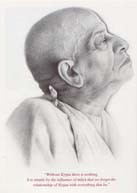
SRILA PRABHUPADA'S QUOTE OF THE DAY
When we are children, innocent, we have no bad
habits, but as we grow and associate with bad company, we also acquire
all these bad habits. To give up all these bad habits means we have to
associate with sadhus or devotees, saintly persons.
Then we can give it up. This is called anathanivrtti,
means giving up all unwanted bad habits.
Mexico, February 11,1975
Sign-up to receive these quote HERE:
mailto:haribol@pacific.net.sg

Bhaktivedanta Vedabase Network ...
http://vedabase.net/


The Scientific - Mathematical
Proof for God's existence:
http://geocities.com/sector114

http://robot-hosting.com/php/login_nicholas.html
user name = guest
password = guest
(Collection of philosophical and mathematical proofs
for existence of God can be found in this site.)

Scientifically Philosophical Books for the layman
 ...
... ...
...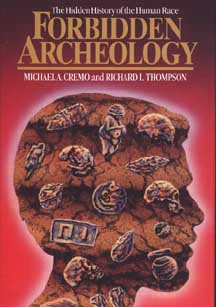 ...
...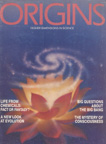
Click on any of these books to read more about them and where to get
a copy
or contact your local temple for purchases
sample of Life
comes from Life HERE.pdf

Lotus Imprints - Preserving Prabhupada's Legacy - The
Publishing House of Hari Sauri dasa
http://www.lotusimprints.com/

Quotes from Shastra - scriptures
View using Balaram font
The uddépanas (secondary causes for relishing
the rasas) include: Lord Kåñëa’s qualities, family, activities,
paraphernalia, age and form.
His qualities include those listed in Çrémad
Bhägavatam 1.16.26-29:
satyaà çaucaà dayä kñäntis
tyägaù santoña ärjavam
çamo damas tapaù sämyaà
titikñoparatiù çrutam
jïänaà viraktir aiçvaryaà
çauryaà tejo balaà småtiù
svätantryaà kauçalaà
käntir
dhairyaà märdavam eva ca
prägalbhyaà praçrayaù
çélaà
saha ojo balaà bhagaù
gämbhéryaà sthairyam ästikyaà
kértir mäno ’nahaìkåtiù
ete cänye ca bhagavan
nityä yatra mahä-guëäù
prärthyä mahattvam icchadbhir
na viyanti sma karhicit
In Him reside (1) truthfulness, (2) cleanliness,
(3) intolerance of another’s unhappiness, (4) the power to control anger,
(5) self-satisfaction, (6) straightforwardness, (7) steadiness of mind,
(8) control of the sense organs, (9) responsibility, (10) equality, (11)
tolerance, (12) equanimity, (13) faithfulness, (14) knowledge, (15) absence
of sense enjoyment, (16) leadership, (17) chivalry, (18) influence, (19)
the power to make everything possible, (20) the discharge of proper duty,
(21) complete independence, (22) dexterity, (23) fullness of all beauty,
(24) serenity, (25) kindheartedness, (26) ingenuity, (27) gentility, (28)
magnanimity, (29) determination, (30) perfection in all knowledge, (31)
proper execution, (32) possession of all objects of enjoyment, (33) joyfulness,
(34) immovability, (35) fidelity, (36) fame, (37) worship, (38) pridelessness,
(39) being (as the Personality of Godhead), (40) eternity, and many other
transcendental qualities which are eternally present and never to be separated
from Him.
Çréla Jiva Goswämé in
Priti Sandarbha Anuccheda 116 explains that because Lord Kåñëa
is “sama” or “steady in mind” (the 7th quality mentioned in these verses),
He is always firm in His vow.
He explains that “praçraya” means “humbleness,
which brings shyness, appropriate respect for others, and speaking affectionate
words.”
“Çélam” means “good character, which
makes one inclined to take shelter of a saintly devotee.”
“Ästikyam” means “seeing through the eyes
of scripture.”
“Kirti” means “being famous for one’s virtues.”
The Lord’s love for His devotees is prominent among
His qualities. It is a source of great wonder. He melts with love (premardra)
for His devotees.
Courtesy of http://www.vedabase.com/
used
with permission

Sri Hari-bhakti-kalpa-latika
The Flowering Vine of Devotion to Lord Hari
Table of Contents
First Cluster of Flowers 2
Second Cluster of Flowers 7
Third Cluster of Flowers 13
Fourth Cluster of Flowers 15
Fifth Cluster of Flowers 17
Sixth Cluster of Flowers 19
Seventh Cluster of Flowers 23
Eighth Cluster of Flowers 26
Ninth Cluster of Flowers 29
Tenth Cluster of Flowers 30
Eleventh Cluster of Flowers 32
Twelfth Cluster of Flowers 33
Thirteenth Cluster of Flowers 34
Fourteenth Cluster of Flowers 36
Third Cluster of Flowers
1 Praying for the nine activities of devotional service, the author
briefly describes them: O ears, please always hear songs about Lord Visnu.
O tongue, please always chant His glories. O mind, please remember
His Deity form. O limbs, please serve His lotus feet. O hands,
please worship Him and carry out His order. O head, please bow down
to offer respects to Him. O self, please become His friend.
O body, please always be His property.
2 The author explains in more detail: I have not performed pious deeds,
prescribed duties or austerities, and I have no purity, renunciation, good
fortune, or beneficial knowledge. However, now that by the devotees'
mercy I have drunk with my ears the nectar of Lord Hari's names and pastimes,
I will cross the darkness of ignorance.
3 When, loudly singing the devotees' songs of Krsna's names and glories,
my chest anointed with tears, my heart melted, and my body covered with
a network of hairs standing erect will I roll about on that ground, mad
with love?
4 If, because of my sins, I take birth in hell, I will not be unhappy
if Lord Hari stays in my thoughts. However, if I attain a kingdom
on earth or heaven, but cannot think of Lord Hari, there will be no happiness,
but only anguish in my mind.
5 The author confirms his previous explanations: O heart, how long
have you enjoyed the dirty, tasteless pleasures of this world of duality
pungent with the fire of time? Please search again and again for
Krsna's lotus feet, which are a kingdom of the nectar of bliss.
6 Great sages strive for liberation by worshipping the Lord, who is
eternally worshipped by Brahma and others. However, we who are drowning
in the ocean of repeated birth and death will worship the Lord's two lotus
feet birth after birth.
7 Attached to sense happiness, I had reached the ultimate limit of
the pleasures offered by lust. But now, prompted by intelligence
created in a flood of piety, at Lord Hari's feet I have found honey that
extinguishes the fire of repeated birth and death.
8 I do not understand the lessons spoken in the Vedic mantras.
I have no paraphernalia to perform Vedic sacrifices. Still, staying
in this world and remaining in this condition, I will easily worship Lord
Hari by offering water, tulasi and flowers.
9 I bow down before Nanda's son, who is the personification of bliss,
whose form is dark as a new monsoon cloud, and who cannot be known even
by the greatest demigods. The devotees, yearning to understand Him,
meditate on Him as the blissful Supreme Brahman, who is present in the
moving and the unmoving, who is the master of all, and who is the greatest
person in all the universes.
10 I do not pray for a kingdom, the post of Indra or Brahma, knowledge,
mystic powers, or a place in the Brahman effulgence. O Lord, O master
and friend of the poor, I fall down at the shelter of Your feet and pray:
please give me pure and unwavering service to You.
11 I am attached to this house, busy in maintaining my family, not
free from sense gratification, addicted to the six vices, impious and a
servant of wicked masters. Still, I shamelessly desire to serve You.
O Lord eternally worshipped by the devotees, O master of all, my only shelter
is Your mercy.
12 O Lord Murari, when there is unwavering service to Your feet, then
home and sense pleasures lose their power to bind, and the six enemies
(lust, greed, anger, pride, illusion, and envy) become like friends granting
benedictions. This is the kindness of You who are an ocean of mercy.
13 "How can a householder's home and paraphernalia be auspicious?"
Explaining that they are auspicious when engaged in the Lord's service,
the author says: O Lord Madhusudana, if our son, wife, servant, relatives,
friends, associates and wealth are always engaged in Your service, and
if our entire household is offered to Your lotus feet, then You are always
conquered by our services, even though we may be householders.
14 If our eyes are placed in Your Deity form, our ears in Your holy
name and glories, our nose in the fragrances offered to You, the surface
of our bodies in embracing Your devotees, and our tongue in tasting the
food offered to You, then, O Lord Krsna, You are conquered by us, even
though we are engaged in pleasing our senses.
15 O Lord, if we become lusty to attain Your devotional service, angry
at those who blaspheme You, greedy to accept food, flowers and other things
offered to You, enchanted by You, proud to identify as Your devotee, and
intoxicated by drinking the honey of Your lotus feet, then we may easily
defeat the lust, anger, greed, enchantment, pride and intoxication that
are our enemies.
16 O Lord, because the demons meditated on You as their enemy, You
pacified them by liberating them, although You did not give them the nectar
of Your lotus feet. O Lord, may I have friendly feelings towards
You birth after birth, so I may always relish that nectar.
17 Shall I be able to take shelter of Lord Krsna, who is the master
of the universe, the shelter of the goddess of fortune, and very compassionate
to the fallen conditioned souls? Every day I anxiously think in this
way and try to offer myself to Him, the Supreme Personality of Godhead.
Fourth Cluster of Flowers
1 The author now describes the devotional processes of hearing and chanting
the Lord's glories: Whether spoken by oneself or others, when Lord
Hari's holy names and pastimes are jubilantly accepted by the consciousness
through the agency of the ears, that is called sravananam (hearing).
2 When Lord Hari's holy names and transcendental qualities are sung
or recited, that is called kirtanam (glorification). When this process
of kirtanam is performed with the spiritual joy of love of God, it is called
sankirtanam (great glorification).
3 He who drinks with his ears the nectar of Lord Hari's holy names
and pastimes becomes satisfied at heart. Neither a false explanation
of the Vedas, incomplete or perfect knowledge, the path of impersonal liberation,
nor anything else, will be able to lead him astray.
4 What is the use of impersonal speculation? What is the use
of vows and restraints? What is the use of peacefulness? What
is the use of controlling the mind? What is the use of austerities?
What is the use of mystic yoga? What is the use of mantra-chanting?
What is the use of Vedic sacrifices? What is the use of these if
the nectar of krsna-sankirtana, the essence churned from the Vedas and
the goal of all human endeavour, is always brilliantly manifest?
5 Those scorched by the blazing fire of material sufferings, those
afraid of taking birth in hell, and those wishing to atone for hundreds
of sins, should all chant Lord Krsna's holy names, and thus enter the nectar
ocean of love of God.
6 They who desire the lotus flower of Lord Hari's feet should go to
the lake of His glories. When the sun of His holy name rises they
will see the lotus feet that had been covered by the blinding darkness
of maya.
7 Krsna enters the listening ear and goes to the heart. Flooding
the lake of the heart, He leaves through the mouth as a swiftly coursing
stream of His transcendental qualities, names and forms.
8 In a heart made fickle and impure by the nature of this age the great
yogis' meditation can never be perfected. He who desires Lord Hari
should abandon yoga and instead hear and chant the Lord's names and pastimes.
9 When the nectar moons of His holy names and qualities destroy the
dense darkness of illusion, the devotees suddenly see Lord Hari's splendid
form in the temple of the heart.
10 The Lord becomes a submissive servant to they who lovingly chant
and hear His transcendental glories and names. Very satisfied with
them, and seeing nothing else sufficiently valuable to give, He gives them
His own devotional service, which is difficult even for the demigods to
attain.
11 Immersed in the nectar ocean of Lord Krsna's holy names and pastimes,
the devotees remain always untouched by the fire of material existence,
unseen by lust and other enemies, free from the mud of sinful reaction
and always happy.
12 They whose hearts are washed of mud by the nectar of the infallible
Lord's names and qualities, and who remember Him, worship Him, and serve
His lotus feet, attain their every wish.
13 They who are bumble-bees drinking the honey of Lord Govinda's lotus
feet, they who are expert at relishing transcendental mellows, they who
desire to cross the ocean of material existence, they who desire liberation,
and they who, their hearts free from envy, desire unwavering devotional
service to His lotus feet, should always happily chant the Lord's holy
names, which are nectar for the ears.
14 From Lord Hari liberation, transcendental knowledge, and purity
of heart become manifest. Wonderful nectar to be drunk by the ears
flows from Him. Exalted souls feet great devotion for Him.
Who will not hear and chant His glories?
15 They who in distress, or even in contempt, once chant one holy name
of Lord Hari, cross an insurmountable ocean of sins. How, then, can
we describe the fortune of they who always chant the Lord's names with
faith?
16 Lord Hari, the enemy of the demons, has unlimited auspicious pastimes
and names. Although the tongue is under the speaker's control and
the ears are always active, alas, alas, the fools still enter the darkness
of ignorance.
17 .Overcome with love of God and their forms splendid with transcendental
bliss, some great souls loudly chant the Lord's holy names, some softly
chant the holy names, and some hear the sweet glories of the Lord.
18 When such a great soul hears or chants the holy name, he becomes
overwhelmed with happiness. His voice become choked with tears, the
hairs of his body stand erect, and he becomes unaware of external events.
19 When a great devotee relishes hearing the glories of the Lord sung
by another, his mind becomes intoxicated with spiritual bliss. Impelled
by love of God, he dances, loudly sings, talks nonsense, and laughs, without
any shame, and just like a madman.
20 Day and night plunged in the waves of intense love of God, their
material duties abandoned because of spiritual knowledge, dancing, and
their voices choked with joy by chanting Lord Hari's names, these great
souls make the universe successful and happy.
21 If Lord Hari's pastimes, names and glories are happily sung or heard,
then the singers and hearers have already bathed in the celestial Ganges
and other great holy places, performed many austerities and sacrifices,
and already easily crossed the ocean of repeated birth and death.
22 The supremely auspicious, palatable, splendid, pure, eternal, full
of knowledge, full of bliss, delightful to the heart, supremely sweet nectar
of the holy names and pastimes of Lord Hari is the transcendental fruit
of the vine of devotional service. They who jubilantly drink this
nectar become liberated even while residing in this world. They will
not again enter the ocean of birth and death.
Fifth Cluster of Flowers
1 The author how describes the Lord's holy names and pastimes, which
are worthy to be heard and chanted: Desiring to kill the demons,
who were enemies of the three worlds and a great burden for the earth,
Lord Krsna appeared as a jewel in the ocean of Devaki's womb. A little
later, eager to taste the honey of the gopi's lips, He travelled to Vrajabhumi,
and enjoyed pastimes as the son of Maharaja Nanda.
2 The Supreme Personality of Godhead, who merely by His glance creates
the illusory potency mahamaya, the material universe, complete with mahat-tattva,
false-ego, ether, sky and all material elements, the incarnations of Godhead,
and the demigods headed by Hari, Brahma, and Siva appeared in His perfect,
complete, original form in Vrndavana-dhama, the village of the gopis.
3 Although Putana smeared her breasts with poison to kill Krsna, she
attained the transcendental post of being His nurse. How then can
we describe the good fortune of they who always remember Krsna and with
love offer Him palatable sweet milk, nectarlike fruits, or candies?
4 Krsna enjoyed many wonderful pastimes. He killed Trnavarta
and many demons. Taking a nap in His father's courtyard, speaking
sweet words, and playing, He pleased His parents. With His friends
He protected the cows and calves. He pleased the gopis with blissful
pastimes.
5 Breaking a cart with a playful kick of His lotus feet, Lord Hari
troubled His dutiful mother's heart, delighted the boys eager to steal
yoghurt, butter and milk, and placed wonder and fear in the hearts of the
demon kings.
6 While Krsna was drinking the milk of her breasts, Mother Yasoda pushed
Him down onto her lap, and constantly gazed at His lotuslike face.
Blinded with love and joy, she sweetly kissed Him. May the glory
of Mother Yasoda's good fortune protect the three worlds.
7 One day, when He had stolen butter, His mother became angry and bound
with a rope Lord Hari, whom the great sages cannot even measure.
He said, "I'll not do it again", as He fearfully glanced at her from the
corners of His eyes and cried.
8 With love meditating on Him in their hearts, the great sages become
free from the bonds of repeated birth and death. Because of her love
His mother personally bound Lord Hari with a rope. Love has the power
to bring even the Lord under its control.
9 It is not surprising that by always worshipping the spiritual Supreme
Lord in the heart, the great sages become liberated from their material
bodies. The two sons of Kuvera also became liberated simply by approaching
for a moment the Supreme Lord when He Himself was bound by a rope.
10 Abandoning their calves, the young cows joyfully worshipped Krsna
with abundant nectarean milk. With great love Krsna always protected
them. In this way Lord Krsna, who always protects everyone, became
eternally famous as "Gopala" (protector of the cows).
11 Decorated with peacock feathers, gunja, and many kinds of flowers
and sprouts, with a happy heart He played in the forest with Balarama and
other cowherd friends, whose qualities, age, garments, and handsome features
were like His.
12 Sometimes singing and dancing to the sweet sounds of the flute and
buffalo-horn bugle, sometimes playfully fighting, throwing fruits and flower
petals at each other with their arms, sometimes stealing each other's lunch-basket,
sometimes sitting down to take lunch together, and sometimes imitating
the birds and beasts in the forest, the boys played with Krsna.
13 One day, on the pretext of bowing to the demands of His friends
hungry and tired from playing, Lord Hari, showing mercy to the brahmanas'
devotees-wives, earnestly begged food from brahmanas performing sacrifices
even though He can make nectar appear by His wish.
14 Non-devotional religious rituals, pious activities and austerities
are impediments to the service of Lord Hari's lotus feet, but the regulations
of devotional service are not. Expert in non-devotional piety, these
brahmana's had lost their intelligence and would not worship the Lord,
although their wives, without such so-called pious credits, served the
Lord's lotus feet by offering food to Him.
15 Curious to see Lord Hari's childhood pastimes, Lord Brahma stole
all the calves and boys of Vrajabhumi. Returning later, and seeing
Krsna playing with the boys and calves as before, Brahma became struck
with fear and devotedly surrendered to Lord Krsna's louts feet, which grant
all fearlessness to the devotees.
16 Thinking 'because of this wretched snake, the Yamuna is no longer
a suitable place for Me to enjoy pastimes', angry Krsna approached Kaliya
to kill him. Later, when Kaliya, the king of snakes was about to
leave his home in the Yamuna Krsna showed mercy to him by jubilantly placing
His two lotus feet on the serpent's bowed head.
17 When Indra, the king of the demigods, saw that the sacrifice for
him was stopped, he became intoxicated and blinded with pride of his own
supremacy. He approached the village of Vrndavana to destroy it,
along with its Krsna, by showering devastating rains. When Indra
could understand that Krsna actually was the Supreme Personality of Godhead,
he surrendered to Him. Because Indra was defeated in this way, arrogant
and stubborn people may know how limited is their own strength.
18 Lord Krsna placed Govardhana Hill again upon the earth. To
become purified of his offense, Indra, the king of the demigods, bathed
Lord Krsna with songs of praise. The surabhi cow also bathed splendid
Lord Krsna with white milk as sweet as nectar.
19 Hearing the gopis coming to sell milk products, Krsna calmly ate
some of the palatable fresh butter, threw the remainder about and broke
the pots.
20 Going to each gopi's house, Krsna appropriated the treasury of fresh
butter and ate it. When discovered, He playfully, gently, charmingly,
and disdainfully laughed at His captors.
21 The beautiful gopis performed great austerities to attain the touch
of Lord Krsna's lotus feet. Wishing to fulfil their desire, Krsna
went to the bank of the Yamuna and, eager to hear their clever and eloquent
prayers, stole their garments. When He was pleased by them, He returned
their garments and gave them His lotus feet.
Sixth Cluster of Flowers
1 The author here describes smaranam (remembering the Lord).
Continual remembrance, under all circumstances, of the handsome
form of the perfect and complete Supreme Lord Visnu, who is like an ocean
of transcendental bliss, is called smaranam.
2 The learned have described smaranam as remembering Lord Hari's transcendental
forms and names and also remembering the mantras that help one to attain
Him.
3 They who jubilantly accept Lord Krsna, the son of Maharaja Nanda,
within the residence of their minds, become purified without practicing
astanga-yoga or cultivating transcendental knowledge. The sinful
thoughts within their minds become crippled, and their senses never loiter
on the path of materialism.
4 His form like a delightful dark monsoon cloud, Lord Hari is like
an ocean of transcendental bliss that enjoys pastimes in Vrndavana forest.
They whose minds become immersed in that ocean of Lord Hari never become
scorched by the great blazing fires of material suffering, and they cannot
be harmed by the malevolent black snake of the Kali-yuga.
5 They who constantly meditate on Lord Govinda's feet, and do not consider
anything else to be valuable, never again flounder in the ocean of material
existence, so full of suffering. For them, the rising moon of knowledge
of the Supreme Lord dissipates all the darkness of ignorance. They
drink the real, imperishable and eternal nectar of transcendental bliss.
6 Vrndavana is decorated with madly dancing peacocks, blossoming flowers
full of humming bees, and many different trees with budding twigs.
In the middle of it is a desire tree with pearl flowers, emerald leaves,
and many kinds of jewel fruits. May the reader meditate on that tree.
7 Beneath that desire tree is a great and beautiful golden temple,
with a hundred columns fashioned from great jewels, walls made of rubies,
and many roofs decorated with flags moving in the breeze. Within
that temple is a great throne made of rubies, and on that throne is an
eight-petalled red lotus flower. Let the reader meditate in this
way.
8 Seated on that throne is Lord Krsna, who is never unhappy, whose
handsome form is a dark monsoon cloud, whose face is a full moon,
who gracefully bends in three places, whose limbs are splendid with ornaments,
and who is served by gentle breezes reddened with flower pollen from the
Yamuna's blossoming lotus forest, breezes that move the garments of the
beautiful-eyed gopis.
9 Adorned with anklets, His blossoming red lotus feet are marked with
a flag, barleycorn, elephant-goad, lotus, and other auspicious signs.
His graceful toes are splendid with toenail-moons.
10 His broad knees are handsome. His thighs are like plantain
trees. His hips are splendid with an exquisite belt. His garments
are yellow silk. His playfully tilted waist is charming with three
folds of skin. His navel lake has a blossoming lotus entered by a
bumble bee vine of the hair on His torso.
11 In the sky of His sandal and kunkuma-anointed chest a Kaustubha
sun and pearl necklace star shines. With tendril hands and reddish
bud fingernails, the vines of His broad arms are decorated with jewel armlets
and bracelets.
12 He wears a splendidly fragrant garland colourful with kadamba, lotus,
pravala, tulasi, mandara and santanaka flowers and visited by humming bees,
that embraces His neck, rests upon His chest and devotedly reaches down
to His feet.
13 On His neck, which mocks the conchshell, and which is always splendid
with a garland of stars around the full moon of His face, a gunja necklace
rests. On the pretext of the nectar of restless smiles flowing from
His reddish lips, day and night He emits a great flood of bliss from His
mouth splendid as millions of moons.
14 His cheeks are splendid with swinging earrings of gold and jewels.
His large, smiling lotus eyes are graceful with tilting eyebrows.
His handsome raised nose is decorated with a glistening pearl. His
forehead is marked with a tilaka drawn in gorocana and musk.
15 His head is decorated with a glittering jewelled crown and a peacock
feather. Glistening curling hair, dark as anjana, graces His forehead.
Slightly tilting His neck, and moving the blossoming twigs of His fingers,
He fills the flute with the nectar of His lips.
16 He is artistic and youthful. His handsomeness defeats Kamadeva.
He is a palace of charming pastimes, an ocean of bliss, an ocean of playfulness,
and an ocean of sublime intelligence. He is the only abode of mercy.
He is the Supreme Personality of Godhead, the happiness of the three worlds.
17 The cakora birds of their hearts intoxicated by tasting the nectar
flute-sounds flowing from the moon of His mouth, their lotus faces smiling,
their eyes filled with sidelong glances, their forms decorated with various
jewels, their colourful saris moving about their broad hips, and their
hands holding many presentations, the girls of Vraja eternally serve Him.
18 The black bumblebees of the gopis' eyes lick the lotus flower of
His face. Tasting the sweet nectar of His lips, the gopis happily
worship Him. They serenade Him with flutes and vinas. He is
surrounded by cowherd friends, His equals in age, handsomeness, decorated,
transcendental qualities, speech and form.
19 When He played His flute, the great oxen and white cows, their mouths
still full of grass, picked up their heads and gazed at the Lord, attentively
listening to His music. Their calves still drinking milk from their
udders, the cows slowly approached Him and surrounded Him on all sides.
20 Beyond them the demigods headed by Brahma offer obeisances and prayers
before Him. Sanaka and other great yogis who aspire for liberation
are behind Him. The sages who try to amass pious credits recite the
Vedas at His right side. The Gandharvas and Vidyadharas sing, dance
and play musical instruments at His left side.
21 Ardently devoted to the Lord's lotus feet, his hair matter, his
form golden as the moon and the hairs of his body erect, Brahma's son Devamuni
Narada, plays the vina and sings prayers from the sky to Lord Krsna, who
enchants the entire universe, and who is the abode of all spiritual happiness.
One should meditate on the Lord in this way.
22 The author further explains: I meditate on Lord Krsna, who is splendid
as a dark monsoon-cloud, whose large eyes are red lotus petals, whose waist
is tied with a belt, whose little teeth are beginning to appear, who is
sweeter than nectar, and who, called by His mother, crawls to Her on His
hands and knees in His home in Vraja.
23 I meditate on Lord Krsna, who is splendid as a blossoming blue lotus
flower, whose eyes are red lotuses, who wears a peacock-feather crown,
who holds a pat of fresh butter in His hand, whose anklets tinkle, who
is surrounded by His calves, who smiles, who is sweeter than nectar, and
who has begun to dance.
24 I gaze on the cowherd boy Krsna, who is now exhausted from artistic,
enthusiastic, playful dancing, whose cheeks glisten with earrings, who
follows the cows, who is surrounded by dancing cowherd boys, who wears
a yellow cloth about His waist, who holds a flute in one hand and a staff
in the other, and who ties His hair with a rope meant to tie the calves.
25 The cows are in front. The boys, all dressed alike, follow.
In the middle are Krsna and Balarama, walking as two intoxicated elephants
and playfully moving Their limbs. They wear peacock feather crowns
and carry a flute, bugle and stick. Eager to enjoy pastimes in Vraja,
They smile. I meditate on Them.
26 When they hear the sound of the flute placed to His lips, the calves
prick up their ears and let the milk trickle from their mouths. Lord
Gopala is very eager to enjoy pastimes with the cowherd boys, His equals
in qualities, age, dress, and playfulness. O friend, please meditate
on Lord Gopala, whose form is splendid as a monsoon cloud, and who is decorated
with a garland of forest flowers.
27 His form gracefully bending in three places and His lotus feet playfully
moving, Lord Krsna dances in the midst of the doe-eyed gopis, who also
dance and clap their hands. As He dances Krsna smiles, and His earrings
move. Holding His flute in one hand, He takes the fresh blossom of
Srimati Radharani's hand in the other. In this way one should meditate
on Lord Krsna, who is dark as a monsoon cloud.
28 One hand resting on the shoulder of a gopi and the other holding
a lotus flower, His eyes expanded, His peacock feather crown moving, and
His kadamba garland shaking away humming bees, Krsna dances with the gracefulness
of an intoxicated elephant. My heart yearns to drink the dark nectar
of Lord Krsna.
29 His chest marked with the kunkuma powder from the gopi's breasts,
His lips marked with their black eye-cosmetics, His cheeks reddened by
the betel-nuts they chewed, and His forehead coloured with the reddish
powder anointing the part in their hair, Krsna quickly left the cottage
in the grove of Vrndavana forest and arrived at His own house at sunrise.
When the gopis saw Him, they made jokes about the tell-tale marks on His
person, and Krsna blushed with embarrassment. One should meditate
on that Lord Krsna, the transcendental son of Yasoda-devi.
30 Lord Vasudeva holds a club, conch, cakra and lotus in His four broad,
handsome arms, and He is decorated with exquisite belts, earrings, necklaces,
and bracelets. He wears yellow garments, and bears the mart of srivatsa.
He is served by His associates, and surrounded Sri (beauty), Kirti (fame)
and His other personified opulences. One should meditate on that
Lord Vasudeva, who is splendid as a sapphire.
31 Holding a bow in His broad, handsome arms, His form decorated with
anklets, bracelets, necklaces, and earrings and constantly served by Laksmana
and Hanuman, and His face gazed at by Sita-devi from the corners of Her
large eyes, Lord Ramacandra, who is dark as durva grass, is full of intense
transcendental bliss. One should always meditate on Him.
32 In this way an intelligent person should meditate on Lord Vasudeva,
who resides in the hearts of all creatures and is equal to all.
33 He who plunges his mind day and night in the nectar of the Supreme
Lord's form and who drinks the nectar of His names, qualities and pastimes,
is always filled with bliss. He is never burned by the great fires
of suffering.
34 They who thus remember Lord Hari become free from all sufferings.
In their hearts they love the Lord. They control the senses.
They trust the Lord. They are intoxicated with spiritual bliss.
They are qualified to worship Lord Krsna's lotus feet.
Seventh Cluster of flowers
coming next

All pictures from Srimad Bhagavatam and Iskcon works - Copyright ©2005
The Bhaktivedanta Book Trust
International, on the web at .http://www.krishna.com/.
Used with permission.









![]()
![]()
![]()

![]()
![]()
![]()
![]()

![]()
![]()
![]()
![]()















